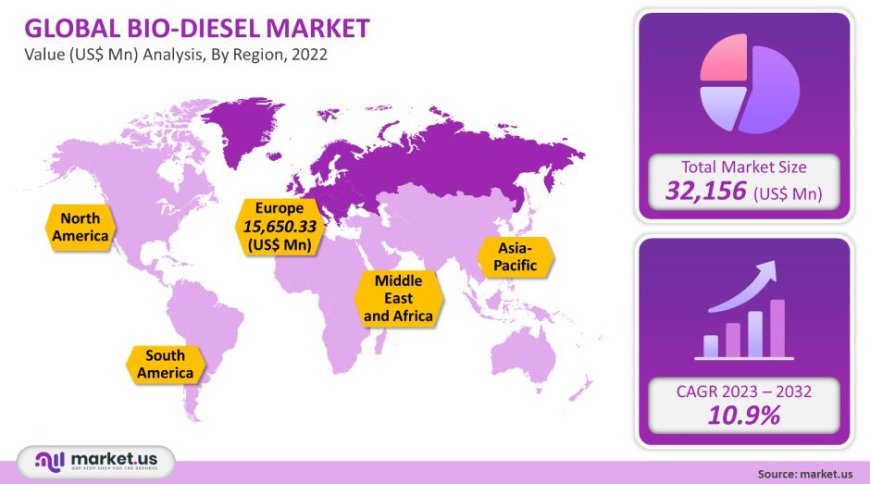Biodiesel Market 2023 Segment Overview, Company Profiles, Regional Analysis and Forecast 2032
Biodiesel market size was estimated at USD 32.156 million in 2022 and expected to experience compound annual compounded growth between 2022-2032 of 10.9% compound annual rate.

Market Overview
Biodiesel Market is an affordable, renewable alternative fuel which can be used in existing diesel engines without modifications. Comprised largely of recycled cooking oil, agricultural feedstock and animal fats derived from their recycling programs, Biodiesel fuel reduces greenhouse gas emissions while simultaneously decreasing air pollutants.
Biodiesel market size was estimated at USD 32.156 million in 2022 and expected to experience compound annual compounded growth between 2022-2032 of 10.9% compound annual rate.
Biodiesel Market Dynamics:
Drivers:
An increasing demand for renewable energy: Biodiesel is an environmentally-friendly option that reduces greenhouse gas emissions while simultaneously improving air quality - this makes it an attractive proposition for governments and businesses alike.
Fluctuating petroleum prices: Biodiesel provides an alternative fuel that is less susceptible to price fluctuation, providing more stability and affordability for many consumers.
Biodiesel production from an increasing variety of feedstocks: With vegetable oils, animal fats and used cooking oil as potential feedstocks for biodiesel production becoming more readily available than ever, production costs have decreased and made biodiesel more cost-competitive with traditional fossil fuels.
Government Support: Many governments worldwide are offering financial incentives and other forms of support to promote biodiesel use, helping increase its demand and make its market more attractive to investors.
Free PDF Sample of Our In-depth Report: https://market.us/report/biodiesel-market/request-sample/
Restraints: Government Policies: These can have a major effect on biodiesel markets as they can have subsidies or mandates in place that support biodiesel production while others impose tariffs or other trade barriers which inhibit it.
Environmental Concerns: Although biodiesel may be more sustainable than traditional diesel fuel, its production can cause deforestation and soil erosion, in addition to emitting more nitrogen oxides (NOx). This contributes to air pollution.
Competition with food crops: Some biodiesel feedstocks such as vegetable oils can also be used for food production, which can create competition for land and resources that drives up both costs of biodiesel production and of its final product.
Feedstock availability: Biodiesel production can use various feedstocks such as vegetable oils, animal fats and used cooking oil; however, their availability can be restricted during drought-stricken conditions or other agricultural disruptions.
Opportunities:
Demand: for renewable energy is on the rise globally. Governments around the globe have established ambitious targets to reduce greenhouse gas emissions and expand renewable energy use; biodiesel provides a clean-burning, renewable fuel option that can help governments meet these ambitious goals.
Establishing new biodiesel feedstocks: Traditional biodiesel feedstocks like soybeans and rapeseed can compete with food production for limited resources, making the production of biodiesel less sustainable and making waste oils and algae an easier source for generating biodiesel fuel.
Develop new biodiesel applications: Biodiesel can be used in many different applications, from transportation and power generation to industrial. By creating new applications for this renewable fuel source, expanding the market can be made more viable.
Consultation Services for Biodiesel Use: Businesses and organizations looking into using biodiesel can benefit from consulting services for biodiesel use. Expert biodiesel consultants can assist clients in selecting appropriate feedstock, designing production facilities and devising marketing/distribution strategies for their biodiesel production operations.
Challenges:
Feedstock costs and availability: Biodiesel production relies on various feedstocks such as edible oils, non-edible oils, and waste oils as sources for production. Their availability depends on a range of factors such as weather conditions, crop yields, demand from other industries etc. which makes maintaining consistent and competitive pricing difficult for biodiesel producers.
Government Policies and Incentives: Government policies and incentives play a pivotal role in shaping the biodiesel market. Tax breaks, subsidies and blending mandates all play a part. But different government policies may vary from country to country and over time; creating uncertainty for producers and investors of biodiesel.
Public Awareness and Acceptance: Biodiesel is still relatively unfamiliar among consumers, which makes selling it challenging. Furthermore, some have concerns over its production's potential environmental effects such as deforestation or competing for food crops with biodiesel production.
Technical Challenges: Biodiesel can be corrosive, creating issues in certain fuel systems. Furthermore, transport and storage may be more challenging with biodiesel than petroleum diesel.
Key Market Segments:
By Feedstock:
- Vegetable Oil
- Soybean Oil
- Canola Oil
- Corn Oil
- Palm Oil
- Other Vegetable Oils
- Animal Fats
- Poultry
- White Grease
- Tallow
- Other Animal Fats
By Application:
- Fuel
- Marine
- Automotive
- Power Generation
- Agriculture
- Other Applications
Key Market Players:
- Ag Processing, Inc.
- Archer Daniels Midland Company (ADM)
- Cargill, Inc.
- Eco diesel Colombia S.A.
- Manuelita S.A.
- Renewable Biofuels Inc.
- Wilmar International Ltd.
- Bunge Ltd.
- Other Key Players
Contact us
Global Business Development Team: Market.us
Market.us (Powered By Prudor Pvt. Ltd.)
Send Email: inquiry@market.us
Address: 420 Lexington Avenue, Suite 300 New York City, NY 10170, United States
Tel: +1 718 618 4351, +91 78878 22626
What's Your Reaction?
 Like
0
Like
0
 Dislike
0
Dislike
0
 Love
0
Love
0
 Funny
0
Funny
0
 Angry
0
Angry
0
 Sad
0
Sad
0
 Wow
0
Wow
0













































